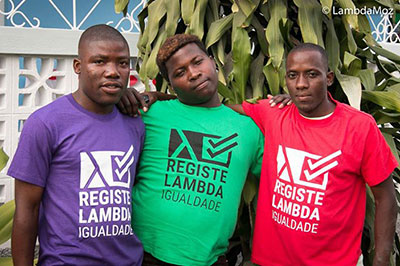Mozambique accused of “double speak” on LGBTI Rights

Lambda supporters wear t-shirts calling for the registration of their organisation (Pic: Lambda)
While Mozambique has been praised for having legalised homosexuality last year, its government continues to refuse to recognise the country’s biggest LGBTI group.
On Monday, Human Rights Watch accused the nation of “double speak” following a review of its human rights record at the United Nations Human Rights Council in Geneva.
In June, Mozambique new penal code came into effect, removing articles in the previous penal code that allowed for “security measures” against people “who habitually engage in vices against nature.”
Lambda, the country’s leading LGBTI rights organisation, welcomed the move at the time as “a victory”.
Despite the positive development, the government has six months later still not budged on its eight-year refusal to allow Lambda to register as an NGO, a process that usually takes just six weeks.
Justice Minister Abdurremane Lino de Almedia told the UN Human Rights Council last week that the group, while not registered, could “freely exercise their activities on Mozambican territory.”
He went on to say that the government would “undertake a series of consultations on the urgency and the pertinence of registering this entity.”
The UN Human Rights Council has been calling on Mozambique to register Lambda since 2011. On Twitter, Lambda commented that while its members “are free” the group is still “not recognised.”
Zenaida Machado, Human Rights Watch Africa Division Researcher, said that there is no public record of any other group in Mozambique requiring consultations on “urgency” and “pertinence” before being registered as an association.
“The failure to register Lambda in this arbitrary manner is a clear violation of their right to association, guaranteed under Mozambique’s constitution and in international law,” she wrote.
“This treatment, clearly linked to the fact that it is an LGBT group, is also discriminatory,” Machado added.
“Having taken the decision to decriminalise homosexuality the government should now end the unjustified interference with the right to freedom of association for LGBT people. It’s time for the government’s half-hearted commitment to respect LGBT rights to become complete,” she argued.
Botswana’s LGBTI group LEGABIBO is also currently embroiled in a legal battle to force its government to recognise its constitutional right to exist as a legal entity.
Leave a Reply